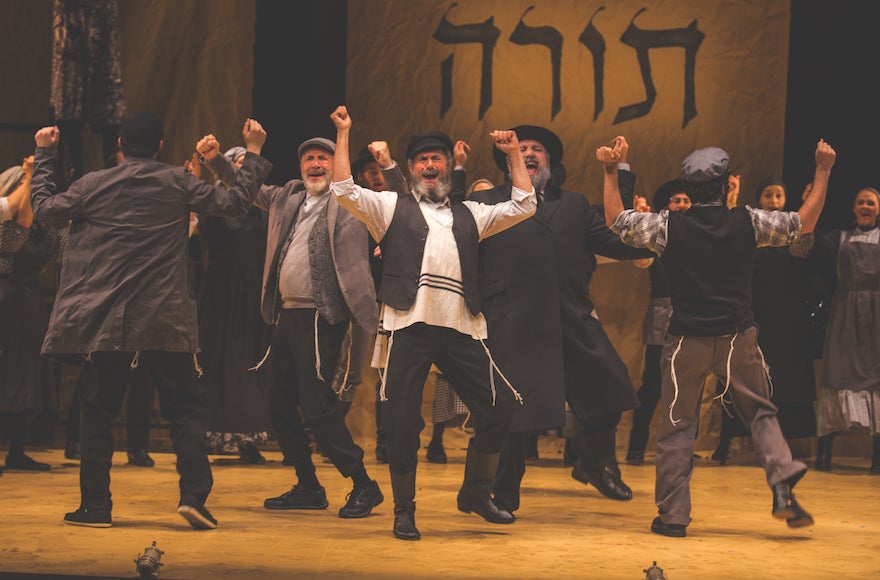(New York Jewish Week) — After a smash-hit run interrupted by COVID, “Fiddler on the Roof in Yiddish” is returning next week for a seven-week run at Manhattan’s New World Stages.
For many in the cast, Jewish or not, returning to “Fiddler” feels emotional — especially in a time of world upheaval, rising antisemitism and another refugee crisis in Ukraine, where the play’s fictional shtetl, Anatevka, would have been located.
“It hurts how relevant it is,” said Rosie Jo Neddy, who plays Chava, the third oldest daughter of the play’s protagonist, Tevye the dairyman. “We do art to talk about these things. I just hope that people walk away remembering that silence hurts and are moved to some action in some way.”
“Fidler Afn Dakh,” directed by Joel Grey, is a production of the National Yiddish Theater Folksbiene, and started off as a small production with a two-week long run at Manhattan’s Museum of Jewish Heritage. It was extended several times, and played off-Broadway for more than a year before it was shut down due to the pandemic in 2020.
Now, as the production heads into its final days of rehearsals, the New York Jewish Week sat down with a some of the returning actors — Neddy, James Monroe Stevko, Rachel Zatcoff and Jodi Snyder — and choreographer Staś Kmieć to talk about acting in Yiddish and what the return of the show means to them. (The conversation was presented Monday, Nov. 7, as a Zoom event.)
Kmieć has been involved in “Fiddler” productions his entire life. Early in his career, he worked with Jerome Robbins, the Broadway show’s original choreographer.
But with Yiddish “Fiddler,” Kmieć had the opportunity to draw out different tones in the show, in some cases making it more Jewish by incorporating traditional wedding dances, Jewish folk dances and ethnic dances of the region.
“The traditions are in [this production] more than the original,” Kmieć said. “It was always considered that they were being respectful of the culture and putting in as many elements as they could, but I take it even further.”
For the actors, learning Yiddish was a challenge — though it was one that they were willing to take on together. Though Stevko, who is not Jewish, knew little about Judaism and Yiddish before the show, he found it meaningful to be able to do the show in Yiddish. (Stevko also recently performed in an English version of the show at the Lyric Opera House of Chicago.)
“To me, the language really acts as a set piece, almost — it transports you to this village,” he said. “As someone who is a language hobbyist, I think there is something beautiful about every language. They have their own melodies and sounds — even ingrained in just the sounds is an entire culture behind it. We infuse our culture within our language and it sets the tone for the entire show and it affects people.”
“I think that the show being in Yiddish, being in this language that these people would have been speaking at the time, makes everything go into a deeper place for us as performers, and for the audience watching our show, honestly, whether you’re Jewish or not,” said Zatcoff, who is reprising her role at Tzeitel, the milkman Tevye’s oldest daughter.
Regardless, everyone is happy to be back with the “mishpuche” — that’s Yiddish for “family” — as they prepare for the run at the New World Stages on W. 50th St. beginning on Sunday, Nov. 13. (Get tickets and info here.)
Out-of-towners, don’t fret: Kmieć hinted at a possible national tour in the works.
For more of our conversation, watch the recording below:
The New York Jewish Week brings you the stories behind the headlines, keeping you connected to Jewish life in New York. Help sustain the reporting you trust by donating today.





